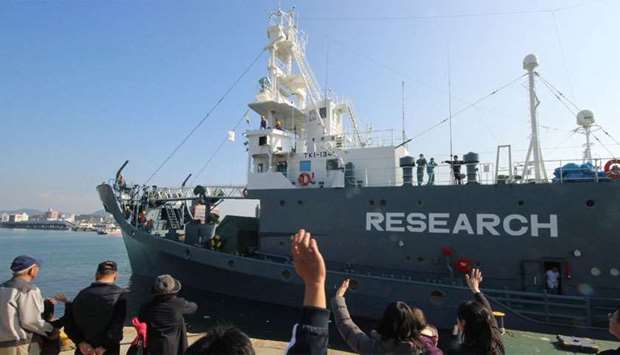The Japanese government Wednesday announced that it is withdrawing from the International Whaling Commission.
In a move that had been expected, the government said it will resume commercial whaling from July.
Environmental organizations criticised the move.
‘It's clear that the government is trying to sneak in this announcement at the end of year, away from the spotlight of international media, but the world sees this for what it is,’ said Sam Annesley, executive director at Greenpeace Japan.
‘The declaration today is out of step with the international community, let alone the protection needed to safeguard the future of our oceans and these majestic creatures. The government of Japan must urgently act to conserve marine ecosystems, rather than resume commercial whaling,’ Annesley added in a statement.
Japan had proposed lifting a 32-year whaling ban when the International Whaling Commission met in Brazil for its annual conference in September. The proposal was rejected.
At the time, Japanese Fisheries Vice Minister Masaaki Taniai said Tokyo had no choice but to examine all possible options.
The government in Tokyo has been under pressure from local fishermen to restart commercial whaling.
The IWC agreed to a moratorium on commercial whaling in 1986 to protect whale populations on the brink of extinction.
Japan nevertheless kills an estimated 450 whales annually.
But the government in Tokyo has been thought to have been mulling leaving the whaling commission for some time.
Japan claims ‘fundamental differences’ among members have led the whaling commission to what it calls a dead end.
Japan wants to hunt for whales in its own coastal waters once it leaves the whaling commission.
The country officially halted commercial whaling in 1988, complying with the Commission's moratorium.
Japan has labelled its whaling programme ‘research whaling.’ Tokyo insists that this is permitted under international whaling regulations, though the practice has been strongly criticized internationally and the meat ends up on Japanese dinner tables, however it is less popular nowadays.
The Japanese government believes this can change once commercial whaling resumes. It notes that the use of whales is part of Japanese culture.
Tokyo argues that with a moratorium in effect for more than 30 years, populations of endangered whale species will have had plenty of time to regenerate.
The other two countries that still hunt whales commercially are Norway and Iceland.

